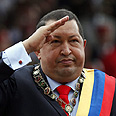
Venezuela's Hugo Chavez dies from cancer
President Hugo Chavez dies after two-year battle with cancer; VP blames illness on 'foes'
Venezuelan President Hugo Chavez has died after a two-year battle with cancer, ending the socialist leader's 14-year rule of the South American country, Vice President Nicolas Maduro said in a televised speech.
The flamboyant 58-year-old leader had undergone four operations in Cuba for a cancer that was first detected in his pelvic region in mid-2011. His last surgery was on Dec. 11 and he had not been seen in public since.
Related stories:
- Chavez: 'Genocidal' Israel will be put in its place
- Iranian, Venezuelan leaders rebuff US
- Chavez meets with Venezuela's Jewish leaders
"It's a moment of deep pain," Maduro, accompanied by senior ministers, said, his voice choking.
In a special press conference held earlier today, the Venezuelan VP blamed Chavez's illness on foreign agents. "We have no doubt that commander Chavez was attacked with this illness," Maduro said, repeating a charge first made by Chavez himself that the cancer was an attack by "imperialist" foes in the United States in league with domestic enemies.
"The old enemies of our fatherland looked for a way to harm his health," Maduro said, comparing it with allegations that Palestinian leader Yasser Arafat, who died in 2004, may have been poisoned by Israeli agents.
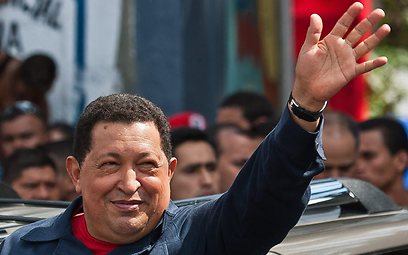
Chavez, during last October's election (Photo: EPA)
With the president’s death, the Constitution says that the nation should “proceed to a new election” within 30 days, and that the vice president should take over in the meantime. The election is likely to pit Vice President Nicolas Maduro, whom Mr. Chavez designated as his political successor, against Henrique Capriles Radonski, a young state governor who ran against Mr. Chavez in a presidential election in October.
Venezuela's military chiefs appeared live on state TV on Tuesday to pledge their loyalty to Vice President Nicolas Maduro following the death of President Hugo Chavez. Chavez had named Maduro as his preferred successor.
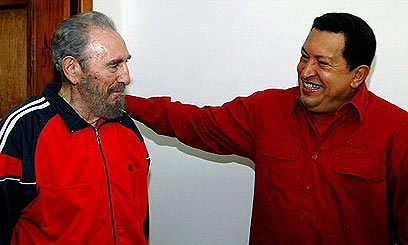
Chavez with Fidel Castro (Archvies: AP)
Chavez easily won a new 6-year term during the October election and his death will devastate millions of supporters who adored his charismatic style, anti-US rhetoric and oil-financed policies that brought subsidized food and free health clinics to long-neglected slums.
Detractors, however, saw his one-man style, gleeful nationalizations and often harsh treatment of opponents as evidence of an egotistical dictator whose misplaced statist economics wasted a historic bonanza of oil revenues.
Chavez's death paves the way for a new election that will test whether his socialist "revolution" can live on without his dominant personality at the helm.
Chavez, who never disclosed what type of cancer he had, died in a hospital in Havana, Cuba.
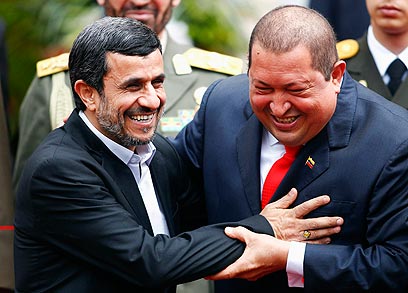
Chavez and Iranian President Ahmadinejad (Photo: EPA)
Humble beginnings
Born to a poor family on July 28, 1954, Chavez once aspired to be a painter and then a professional baseball player. He often explained politics using baseball metaphors and the folksy language of the llanos he learned during his childhood.
A former lieutenant colonel, Chavez spent much of his later military career conspiring with other leftist officers to overthrow the traditional political order. He led a failed coup in 1992, but was able to capitalize on his popularity and later become president.
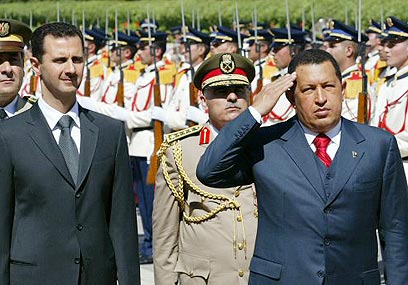
Chavez with Assad (Photo: AFP)
Chavez won the 1998 presidential election and took office early the following year. Opposition politicians and dissident troops attempted to overthrow him in 2002, but supporters and loyal soldiers swept him back to power in less than two days. Chavez accused the US government of backing the putsch.
Chavez has enjoyed wide backing among Venezuela's poor majority with massive social spending to expand health and education programs, financed by income from oil exports.
He also cultivated support by confronting the US, which he denounced as a decadent empire. He often threatened to shut off the US' oil supplies, but the latter still Venezuela's biggest export market.
Chavez's Venezuela enjoyed close ties with Iran, with which it shares its anti-American position. Iranian President Mahmoud Ahmadinejad made frequent visits to Caracas and the two countries bolstered their ties through a series of security and economical treaties over the past few years.
Inspired by his friend and mentor, Cuba's Fidel Castro, Chavez has taken Venezuela down an increasingly radical path, nationalizing large swaths of the economy and running the government with a personalized – many say autocratic – style. Opponents said he was an old-style Latin American "caudillo," or dictator, repressing critics, squandering the nation's oil wealth and ruining its economy.
In mid-2011, Chavez announced that he was being treated for cancer. He had three operations in Cuba, after which he declared himself completely cured. In December 2012, two months after his re-election, he revealed that he had relapsed. He was hospitalized in Cuba again, but eventually succumbed to a severe lung infection.
Chavez is survived by his four children: Three from his first marriage and one from his second.
AP and Reuters contributed to this report
- Receive Ynetnews updates directly to your desktop










